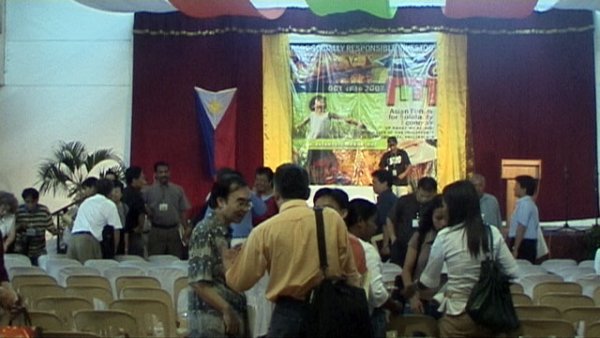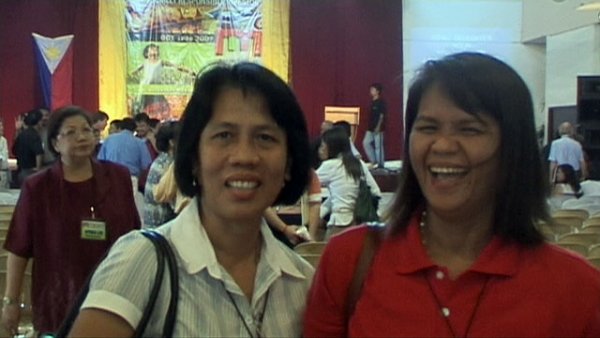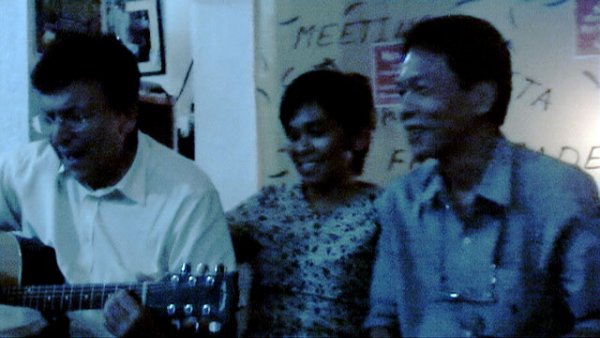

Report on Asian Solidarity Economy Meeting
par Betsan MARTIN
Thèmes forts liés :
Economie et Responsabilité .
Thèmes généraux liés :
Économie .
Quezon City, Philippines, October 2007
Relate to the Pacific with an approach of humility before the land and before the people
This report is focused on areas of particular interest to RESPONSE and the Charter for Human Responsibility, highlighting contributions to Across Oceania Te Au o Te Moana.
Firstly, profound appreciation to :
![]() Solidarity Economy committee for contributing to travel to the Philippines
Solidarity Economy committee for contributing to travel to the Philippines
![]() The FPH and Charter for Responsibility for the opportunity to shape regional Pacific networks in the framework of Responsibility and to bring people together under locally inspired initiatives for local and global benefit.
The FPH and Charter for Responsibility for the opportunity to shape regional Pacific networks in the framework of Responsibility and to bring people together under locally inspired initiatives for local and global benefit.
![]() CID (NZ) for supporting the travel, accommodation and conference costs.
CID (NZ) for supporting the travel, accommodation and conference costs.
KEY MESSAGE
The Philippines hosted the Asian Solidarity Economy meeting, which was given shape through the two interrelated concepts of socially responsible investment as complementary to socially responsible enterprise.

Solidarity Economy has been developed as a system for economic exchange with restoration of humanity as the center. This movement is working with an ethic of Responsibility, and with reference to the international Charter for Human Responsibility. Embedded within the principles of this Charter are environmental principles of precaution, sustainability, and equitable sharing of wealth. I would be interested in explicit engagement with issues of environmental responsibility in the framework of Solidarity Economy.

A presentation by Habito Cielo considered Solidarity Economy for broad-based sustainable development, by referring to the components of a Non-Solidarity Economy, identified as narrow, shallow and hollow !
![]() Example : The 80:20 rule (80% wealth owned by 20% people)
Example : The 80:20 rule (80% wealth owned by 20% people)
![]() 60,000 children die annually from hunger (UNICEF)
60,000 children die annually from hunger (UNICEF)
![]() The Philippines economy grew by 7.5%, but jobs grew by 1.2%
The Philippines economy grew by 7.5%, but jobs grew by 1.2%
![]() The upper level of the population took 50% of the population took 82% of total income.
The upper level of the population took 50% of the population took 82% of total income.
![]() There was reference to exports of electronics and garments and other products of low domestic value
There was reference to exports of electronics and garments and other products of low domestic value
![]() The quality of Education is declining, Health and Nutrition declining, and governance declining
The quality of Education is declining, Health and Nutrition declining, and governance declining
Indicators of Sustainability and Solidarity Economy
Holistic approaches to development – social, cultural, economic, ecological, spiritual,
![]() The countryside as equal partners and beneficiaries in development
The countryside as equal partners and beneficiaries in development
![]() Development is freedom of choices towards capacity enhancement and responsibility to accompany greater economic freedom
Development is freedom of choices towards capacity enhancement and responsibility to accompany greater economic freedom
![]() Development benefits to be across generations
Development benefits to be across generations
Barriers to solidarity Economy :
![]() Socially irresponsible investment, Finance, Enterprise, Governance
Socially irresponsible investment, Finance, Enterprise, Governance
![]() Misdirected education – schools prepare children to work for others rather than create work/wealth ; need entrepreneurial skills
Misdirected education – schools prepare children to work for others rather than create work/wealth ; need entrepreneurial skills
For solidarity economy :
![]() Need access to technology and access to markets
Need access to technology and access to markets
![]() Economic activity related to earth’s productive capacity- added by Betsan
Economic activity related to earth’s productive capacity- added by Betsan
Philippines :
![]() Rich in natural resources
Rich in natural resources
![]() Resilient people
Resilient people
![]() Strategic location in Asia
Strategic location in Asia
![]() Key role in spiritual renewal
Key role in spiritual renewal
An idea : 1 in 4 Philippines families are poor : that is, 3 out of 4 are not poor. So change could be made by I out of 3 ‘non-poor’ families adopted a poor family and supporting the achievement of 1 graduate in each family.
No one is so rich they need nothing from anyone !
Solidarity Economy to be supported by :
![]() Information of Solidarity Economy
Information of Solidarity Economy
![]() Consumption related to environmental ethics
Consumption related to environmental ethics
![]() Education with special focus on youth
Education with special focus on youth
Solidarity Economy is practical and can be shared with global neighbors
Enterprise and micro-financing have distinct roles in the economy
SRE and SRI can be linked through the bayanihan banking window, which links, for example, farmers and investors, and eco-friendly producers
Solidarity Economy to be built on the three-way partnership : Socially responsible investor, producer, consumer
Governance – decision-making that includes those who work on economy and wellbeing of people. Need to overcome fragmented systems in governance.
Human wellbeing depends on our solidarity with the natural world

As part of the RESPONSIBILITY team, Betsan gave a plenary presentation on Governance, and a further discussion of governance issues in the Governing Differently Stream of the Conference.
Principles for Integrated Governance : Working in a Mountains to the Sea framework
![]() Ecosystems approach locally with reference to global ‘climate for change’
Ecosystems approach locally with reference to global ‘climate for change’
![]() Partnership and Collaboration
Partnership and Collaboration
![]() Support indigenous aspirations for land & water and governance
Support indigenous aspirations for land & water and governance
![]() Decision-making involving all interested parties
Decision-making involving all interested parties
![]() Sharing knowledge
Sharing knowledge
![]() Holding the Long view
Holding the Long view
![]() Place for ‘voice’ of environment
Place for ‘voice’ of environment
![]() An interdisciplinary approach with science, social science, economics, indigenous knowledge
An interdisciplinary approach with science, social science, economics, indigenous knowledge
Reference was made to :
![]() New Zealand’s Exclusive Economic Zone,
New Zealand’s Exclusive Economic Zone,
![]() NZ as party to international environmental conventions
NZ as party to international environmental conventions
![]() Declaration of the Rights of Indigenous Peoples, which includes provision for :
Declaration of the Rights of Indigenous Peoples, which includes provision for :
- Self-determination of political status
- distinct political, legal, economic and social institutions and participate in the life of the state
- educational systems with education in indigenous languages
- practice and teach spiritual traditions, protect cultural sites ceremonial objects, and repatriation of human remains
- not be forcibly removed from their lands
- development and to determine priorities for indigenous lands, territories or other resources
- determination of responsibilities of individuals to their communities
In the Environment and Sustainable Development Stream there was a presentation by Wilma Rojas, Univ. of Philippines, on Solidarity Economy and Gender And another on Solidarity Economy and Law
We met with students from the Centre for Positive Futures ; a parent initiated school based on the belief that all Filipino children deserve quality education. It was a response to the plight of families linked to OTRADEV and other NGOs, and extended to provide access to quality education to those who, because of poverty, would not ordinarily avail of education, or specifically values based schools because of hardship.
Students from the Centre for Positive Futures came to the Forum and workshops, including the dynamic session on environmental responsibility, gender and law.
At the concluding round-table session, Betsan gave a message of sharing the imperative of a Solidarity Economy, and noted the Contradiction that Developed economies are working out how to maintain growth in GDP, and Solidarity Economy might support a movement to GPI – wealth measurement that reflects productivity in terms of environment, people and productivity.
Follow-up Joint Partner Activity through FPH and Koha-PICD – NZAID.
Philippines and response, NZ
1. Partnership with Philippines (OTRADEV, PRRM, SANLAKAS) in Across Oceania
2. Enterprise Partnership – economic initiative on the manufacture of solar panels
3. Three-way partnership between Philippines (OTRADEV, PRRM (Philippines Rural Reconstruction Movement), SANLAKAS), Afeafe o Vaeotefaga, Samoa ; and RESPONSE – on Governance and Environmental Responsibility, linking with Solidarity Economy...



